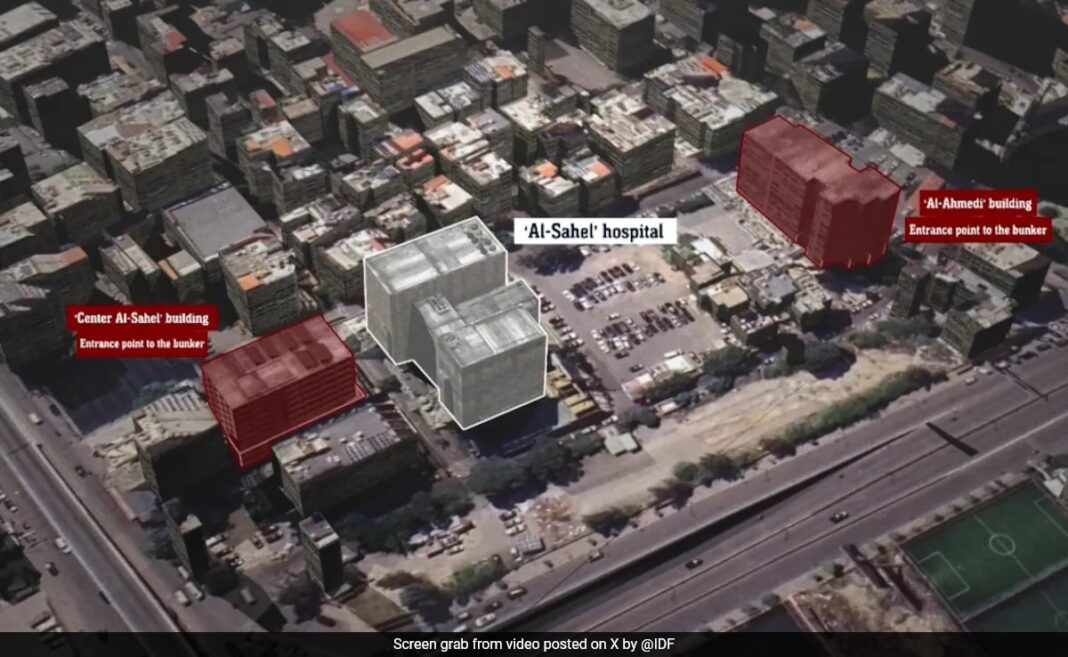New Delhi:
Israel on Monday said it has declassified intelligence which claims the presence of a secret Hezbollah financial hub beneath a Beirut hospital. According to the Israel Defense Forces (IDF), the bunker contained hundreds of millions of dollars in cash and gold, allegedly used to fund the group’s operations.
This disclosure followed a series of targeted airstrikes conducted by the Israeli Air Force on Sunday night, aimed at Hezbollah’s financial assets. IDF spokesperson Rear Admiral Daniel Hagari provided detailed information during a televised briefing, stating, “Tonight, I am going to declassify intelligence on a site that we did not strike-where Hezbollah has millions of dollars in gold and cash in Hassan Nasrallah’s bunker. The bunker is located directly under Al-Sahel Hospital in the heart of Beirut.”
“Tonight, I am going to declassify intelligence on a site that we did not strike—where Hezbollah has millions of dollars in gold and cash—in Hassan Nasrallah’s bunker. Where is the bunker located? Directly under Al-Sahel Hospital in the heart of Beirut.”
Listen to IDF Spox.… pic.twitter.com/SjMZQpKqoJ
— Israel Defense Forces (@IDF) October 21, 2024
Hagari said that the site had not been struck yet, despite the alleged presence of significant financial resources. “According to estimates, there is at least half a billion dollars in dollar bills and gold stored in this bunker. This money could and still can be used to rebuild the state of Lebanon,” he said.
Sunday night’s airstrikes targeted nearly 30 Hezbollah-linked locations, including sites operated by Al-Qard Al-Hassan (AQAH), a financial firm linked to Hezbollah. AQAH, though registered as a charity, has been accused by both Israel and the United States of serving as a critical financial arm of Hezbollah, facilitating its access to cash and gold reserves for military purposes.
Hagari claimed that one of the key targets was an underground vault containing tens of millions of dollars in cash and gold, resources that were allegedly being used to fund attacks on Israel. While Hagari did not clarify whether all the funds were destroyed in the strike, he said that further airstrikes could be expected, particularly targeting additional financial hubs.
The strikes followed an intensified Israeli effort to disrupt Hezbollah’s finances. According to IDF Chief of Staff Lt Gen Herzi Halevi, the campaign involved over 300 strikes on Hezbollah positions in Lebanon over a 24-hour period, including critical financial and logistical hubs.
Al-Qard Al-Hassan has operated in Lebanon since the 1980s, providing credit to Lebanese citizens in exchange for gold deposits. While officially classified as a charity, Israeli and US officials argue that the firm is a critical asset in Hezbollah’s financial network, enabling the group to launder money and finance its activities under the guise of civilian banking.
The Lebanese people and the Iranian regime are Hezbollah’s two main sources of income, Hagari claimed. He alleged that the financial mechanisms used by the group, which include cash transfers through Syria and gold smuggled into Lebanon via Iran. Factories operated by Hezbollah in Lebanon, Syria, Yemen, and Turkey are allegedly used to generate substantial income to support the group’s terror activities, according to IDF intelligence.
In a related development, Israel carried out an airstrike on Monday in Syria, targeting the head of Hezbollah’s financial unit, known as Unit 4400. The unit is responsible for the flow of Iranian funds to Hezbollah, primarily through proceeds from Tehran’s oil sales. The unnamed commander, who had only been in the role for a few weeks, was killed in the strike, according to Hagari.
This marks the second significant assassination of a Hezbollah financial figure in recent weeks. In early October, Israeli forces killed Mohammed Jafar Ksir, also known as Sheikh Salah, the previous head of Hezbollah’s financial operations. Ksir had long overseen the group’s revenue streams, which have been integral to its military and political influence in Lebanon.
The latest Israeli operations came amid an escalation in hostilities between Hezbollah and Israel, which have been ongoing since Hezbollah launched a series of attacks in solidarity with Hamas following the October 7 attacks in 2023.
Israeli officials estimate that approximately 2,000 Hezbollah fighters have been killed since the conflict widened in late September 2023. Hezbollah has retaliated with rocket attacks on Israeli towns and military positions, including a recent barrage aimed at an intelligence base near Tel Aviv.


